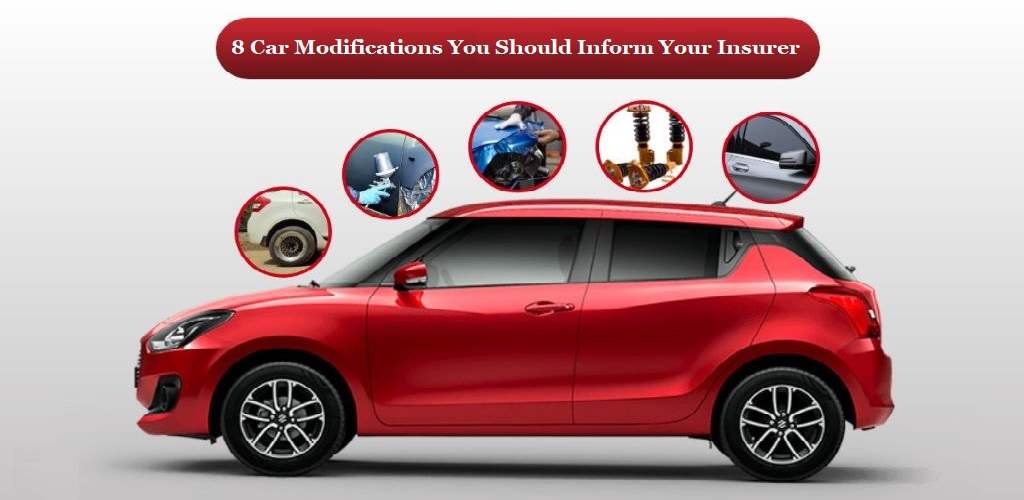Do you want to give a new look to your vehicle? Do you want to make everybody’s heads turn around on the streets? If so, you cannot overlook the importance of car modifications. Car modifications are a great way to personalize your ride and boost its performance. Maybe you’ve thought about adding flashy headlights, sturdy alloy wheels, or sporty spoilers. Or perhaps a bigger turbocharger has caught your eye for extra speed.
Modifying your car can be exciting, but there are a few important things to consider first. Let’s explore what car modifications mean and how they might affect your insurance premium in the long run.
What are Car Modifications?
To put it simply, car modifications include a wide range of changes implemented on a vehicle, deviating from its original factory configuration. These alterations can be categorized into two main types: aesthetic modifications, which are designed to enhance the visual appeal of the car, and performance-related modifications, which aim to enhance its overall performance capabilities. However, it’s important to note that certain modifications may also impact the safety aspect of the vehicle.
Remember that aesthetic modifications are focused on enhancing the car’s visual aesthetics. They involve changes to the vehicle’s exterior or interior appearance, such as applying a fresh coat of paint, installing eye-catching rims, leather seat covers, vinyl wraps, and more. On the other hand, performance-related modifications are intended to optimize the car’s performance, handling, and power.
How do car alterations affect insurance premiums?
There is no denying that car insurance premiums are based on various factors like make, model, specifications, mileage, market value, and vehicle condition. When you modify your car, it changes these factors and affects your insurance premium. For example, imagine you own a standard sedan and decide to enhance its performance by installing a turbocharger, upgrading the suspension, and adding a custom exhaust system. These modifications increase the car’s power and speed, making it more expensive to repair and a higher risk for accidents. Consequently, your insurer raises your premium to cover the risk. On the other hand, if you install advanced safety features like a collision avoidance system or rear view camera then your insurance premium may decrease because these features may reduce the chances of accidents.
8 Things Your Insurer Should Know About Car Modifications
Here is the list of the top 8 things you should inform your insurer about car modifications. Let’s discuss them in detail!
- Report all changes to the Insurer
No matter what changes you make to your car, such as engine upgrades, new paint, custom stickers, or anything else, you should inform your insurer. If you, however, don’t report these modifications, your insurance claim may be denied.
- Modifying the Body
Body modifications, whether for aesthetic appeal or practical purposes like increasing load capacity, alter the vehicle’s original design. These changes might affect the vehicle’s purpose and functionality, so it’s essential to notify your insurer to ensure proper coverage.
- Upgrading the Engine
Another crucial aspect to inform is when you upgrade the engine. Engine modifications, which boost power and speed, also increase the risk associated with the vehicle. This heightened risk usually results in a higher insurance premium, as insurers need to cover the increased potential for accidents and repairs.
- Adjusting Suspension and Braking
Changes to the suspension and braking systems are critical because they directly impact the car’s safety. Any modifications to these systems must be reported to your insurer to ensure your policy accurately reflects the vehicle’s safety features and risk level.
- Enhancing the Interiors
There is no denying the fact that upgrades to your car’s interior, like installing high-end audio systems or advanced air conditioning, can affect your insurance premium. Features such as custom steering wheels, dashboards, and upholstery are also considered in premium calculations, as they alter the vehicle’s value and appeal.
- Changing the Wheels
It is another major thing that you should inform your insurer is upgrading your wheels. Remember that new wheels can make your car look more stylish and increase its market value, which will typically result in a higher insurance premium. Insurers consider wheel upgrades when determining the vehicle’s overall worth and risk.
- Repainting your Car
Specialized paint jobs, including designer or special-purpose paints, can also influence your car insurance premium. Such modifications usually increase the vehicle’s value, leading insurers to adjust the premium accordingly.
- Adapting for Handicapped Users
Last but not least, modifications to make a car more accessible for disabled users, like swivel seats, automatic transmissions, and power steering, need to be reported to your insurer. These adaptations change the vehicle’s standard features and usage, which can affect insurance coverage and premium costs.
Frequently Asked Questions
Listed below are the frequently asked questions related to car modifications. Let’s take a quick look at them.
In India, it’s crucial to avoid altering the chassis or frame of your car in a way that weakens its structure. According to the Supreme Court, making structural changes to cars is entirely prohibited. Any tampering with the fundamental build or frame requires reverting the car to its original factory settings.
If you’re thinking about changing your car’s body, like installing body kits or altering bumpers, you must have approval from the Regional Transport Office (RTO).
Yes, wrapping or painting your car’s roof black is a legal modification that can enhance its appearance without breaking any laws.
You can’t modify the number or structure of seats in your car; they must remain in stock. While adding aftermarket steering wheels isn’t allowed, you can use a leather wrap or other add-ons on the steering wheel.
Underglow lights are usually legal in India as long as they stay covered and unlit while on public roads and don’t flash.








